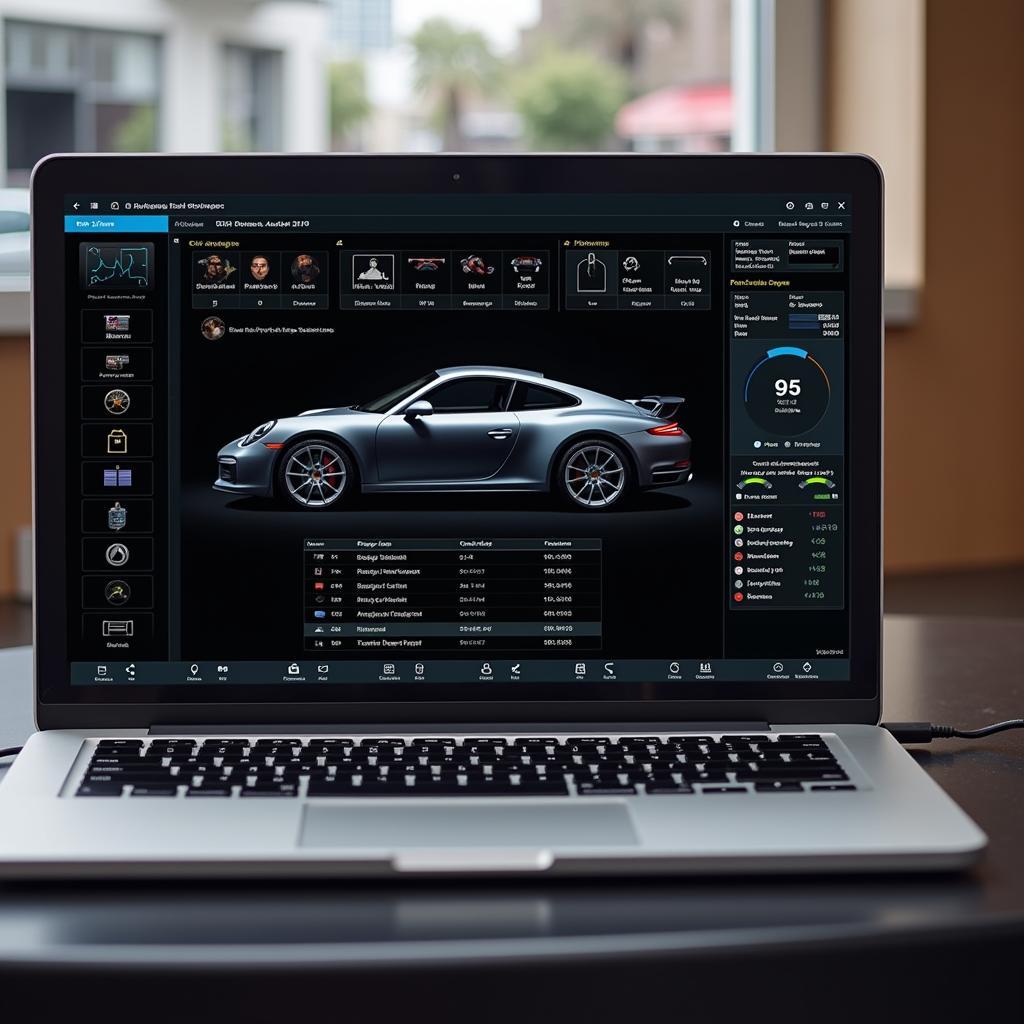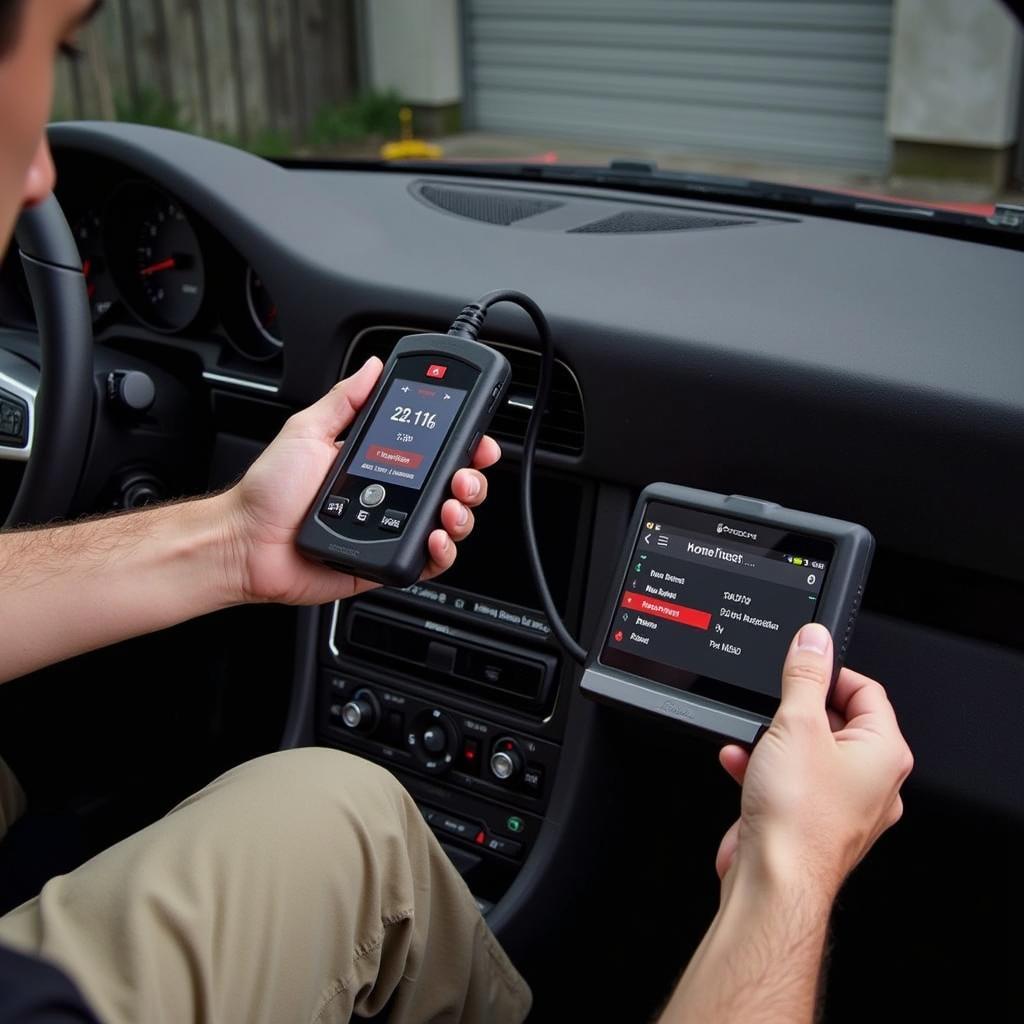Porsche inspection diagnostics are crucial for maintaining the peak performance and longevity of these high-performance vehicles. Whether you’re a Porsche owner, a mechanic, or simply an enthusiast, understanding the intricacies of Porsche diagnostics is essential. This guide will delve into the importance of regular inspections, common diagnostic procedures, and the tools and software used in the process.
Knowing how to properly diagnose your Porsche can save you time and money in the long run. For more information on Porsche diagnostic costs, visit our page on porsche diagnostic cost.
Understanding the Importance of Porsche Inspection Diagnostics
Regular Porsche inspection diagnostics are more than just routine maintenance; they are proactive measures to identify potential issues before they escalate into costly repairs. Early detection of faults allows for timely intervention, preventing further damage and ensuring optimal performance. These inspections involve a comprehensive analysis of various systems, including the engine, transmission, brakes, and electronics, using specialized diagnostic tools.
Common Diagnostic Procedures for Porsches
Several diagnostic procedures are employed to assess the health of a Porsche. These procedures range from visual inspections to sophisticated computer-based diagnostics. A visual inspection often serves as the first step, allowing technicians to identify any obvious signs of wear and tear, leaks, or damage. More complex issues require the use of specialized Porsche diagnostic equipment and software.
Choosing the right scan tool is crucial for effective diagnostics. Check out our guide on the best scan tool for porsche to make an informed decision.
What are the common fault codes found in Porsches?
Some common fault codes encountered during Porsche diagnostics relate to the engine management system, transmission control, and ABS. These codes provide valuable insights into the specific area of concern, guiding technicians towards the root cause of the problem.
How can I perform a basic diagnostic check on my Porsche?
While comprehensive diagnostics require specialized tools, owners can perform basic checks by observing warning lights on the dashboard, monitoring fluid levels, and listening for unusual noises. These initial observations can indicate potential problems that require further investigation by a qualified technician.
The Role of Software in Porsche Diagnostics
Software plays a critical role in modern Porsche inspection diagnostics. Specialized diagnostic software interfaces with the vehicle’s onboard computer systems, allowing technicians to access a wealth of data, including fault codes, sensor readings, and performance parameters. This data provides a detailed overview of the vehicle’s health, enabling accurate diagnosis and targeted repairs.
You can find more details on Porsche DME software on our dedicated page: porsche dme software.
 Porsche Diagnostic Software Interface
Porsche Diagnostic Software Interface
Why Choose Professional Porsche Inspection Diagnostics?
While some basic checks can be performed by owners, professional Porsche inspection diagnostics offer unparalleled accuracy and expertise. Certified technicians possess the knowledge and specialized tools to perform comprehensive diagnostics, identify even the most subtle issues, and provide effective solutions. This expertise ensures that your Porsche receives the proper care and maintenance it deserves. If you’re looking for guidance on how to perform computer diagnostics on a specific model, such as the 2013 Porsche 911, we have a dedicated guide: how to perform computer diagnostic on 2013 porsche 911.
“Regular Porsche diagnostics are not just about fixing problems; they are about preventing them. It’s an investment in the longevity and performance of your vehicle,” says Andreas Müller, Lead Technician at CARDIAGTECH.
Keeping Your Porsche in Peak Condition
Maintaining your Porsche in optimal condition involves a combination of regular maintenance and proactive diagnostics. By adhering to the recommended service intervals and addressing any issues promptly, you can ensure that your Porsche continues to deliver the exhilarating performance and reliability it is known for.
“Early detection is key. Addressing minor issues before they escalate can save you significant time and money in the long run,” adds Maria Schmidt, Diagnostic Specialist at CARDIAGTECH.
Conclusion
Porsche inspection diagnostics are essential for preserving the performance and reliability of these iconic vehicles. By understanding the importance of regular inspections, the diagnostic procedures involved, and the role of specialized software, Porsche owners can take proactive steps to maintain their vehicles in peak condition. Regular Porsche inspection diagnostics are an investment in the long-term health and performance of your Porsche.
FAQ
- How often should I get my Porsche inspected?
- What are the signs that my Porsche needs diagnostics?
- What is the cost of Porsche diagnostics?
- Can I perform Porsche diagnostics myself?
- What are the benefits of professional Porsche diagnostics?
- What type of software is used for Porsche diagnostics?
- How can I find a qualified Porsche technician?
For more in-depth information, explore our 3D scan of the Porsche 911: porsche 911 3d scan.
Need assistance with your Porsche diagnostics? Contact us via WhatsApp: +1 (641) 206-8880, Email: CARDIAGTECH[email protected] or visit us at 276 Reock St, City of Orange, NJ 07050, United States. We offer 24/7 customer support.

